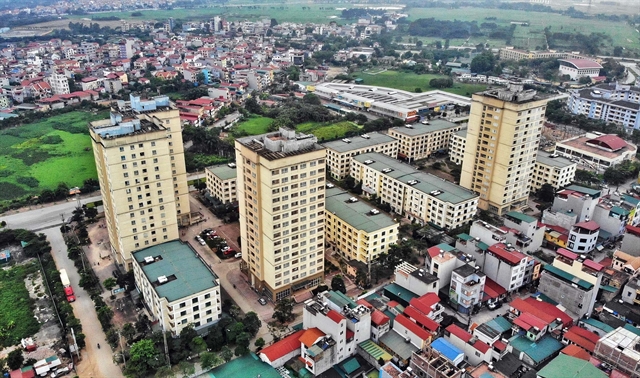The State will employ policies to encourage the development of cheap commercial houses to remove difficulties for the real estate market and enterprises due to the COVID-19 pandemic.

The State will employ policies to encourage the development of cheap commercial houses to remove difficulties for the real estate market and enterprises due to the COVID-19 pandemic.
The Ministry of Construction made the announcement at a seminar on solutions on restoring the domestic real estate market in the post-COVID-19 period. This event was held by the Viet Nam Real Estate Association and Xay dung (Construction) newspaper in Ha Noi on Friday.
The Government recently issued a resolution to provide more capital for social housing development and assigned the Ministry of Construction to work with localities to review social housing projects and housing projects for workers at industrial zones nationwide.
The ministry has also proposed the Government amend Decree 100 on social housing development and management to cut administrative procedures to help businesses invest in this segment, according to Deputy Minister of Construction Nguyen Van Sinh who attended the seminar.
In addition, to develop housing projects for low-income people, the ministry has also built a draft of a resolution on developing low-price commercial houses. At present, the supply of middle and high-end houses is higher than that of low-price houses, showing the need for the Government to intervene.
For instance, the State will increase incentives for businesses investing in commercial apartments with an area of under 75 sq.m per each and an offered price of less than VND20 million per sq.m.
This draft of the resolution is expected to be submitted to the Government in the third quarter of this year, according to the construction ministry.
In the long-term, the ministry must review overlapping regulations relating to real estate investment and business activities and amend them to create good conditions and clear administrative procedures for investors.
As part of that, the ministry is amending the Housing Law and the Real Estate Business Law as well as decrees and circulars to ensure the consistency and reform of administrative procedures.
"In addition, the ministry needs to improve institutions relating to real estate and have a strategic plan for property market management," said expert Can Van Luc.
"The property market needs to make better use of information technology," he said.
Expert Le Xuan Nghia said the quick or slow recovery of the real estate market would depend on the recovery of the economy and policies of the Government.
Basic segments such as industrial real estate, affordable housing, land plots, luxury apartments and shophouses might recover soon, while office and resort real estate might recover more slowly.
The Government's current stimulus packages had had a positive impact on the real estate market. Besides that, there were policies on infrastructure development, key economic zones, industrial parks and reform of administrative procedures and adjustment of laws.
However, the property market still needed solutions in regulations and administrative procedures on auctions for public land and leased land, site clearance and change of land use purpose. Those solutions would simplify procedures and keep the stability of those regulations for several years, Nghia said.
Speaking at the seminar, the construction deputy minister said the COVID-19 pandemic had affected socio-economic development in Viet Nam, including the real estate market.
In the first quarter, large investors with financial ability continued development of their projects, of which 56 projects with more than 20,000 apartments were under construction and 55 projects with 18,000 units were completed.
Suspended businesses in the property sector increased 94.1 per cent year-on-year while 80 per cent of property trading floors nationwide were suspended.
Meanwhile, the property sector attracted only US$264 million of foreign direct investment (FDI), accounting for 3.08 per cent of total national FDI in the first quarter of this year. — VNS





